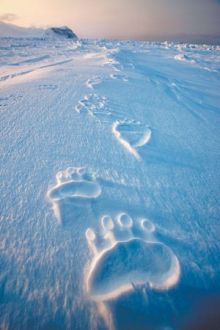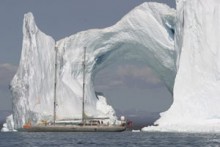For several years international experts have been speculating about the immense energy crisis that will break out after the world’s oil and gas reserves are strained to the limit. Nowadays, the largest deposits of these precious resources are situated in the Middle East, Latin America, Russia, the US, China, Libya and Norway. However, sooner or later those resources will be exhausted. That is why even now many oil-producing countries are thinking about finding new deposits. Considerable oil and gas reserves are concentrated in the Arctic and Antarctic. The international community has recently been focusing on the Arctic. According to the Malaga State University (Spain), from 20 to 25 percent of unexplored oil and gas deposits are situated there. According to another source, those gas deposits make up 30 percent of the world’s gas reserves and 13 percent of oil reserves. So, the ambitions and stakes of the countries having access to the Arctic Ocean are rather high. The US, Canada, Denmark, Norway and Russia share the Arctic territory, divided into polar sectors. Accordingly, these countries are the main competitors for the development of those natural resources.
However, non-arctic countries also have a right to scientific research. For example, China and Iran, despite being far from the Arctic, are taking advantage of this. Ukraine, which is much closer, is not showing any enthusiasm for both the development of natural resources and scientific research. Yet several decades ago about 50 percent of all the research expeditions in the Arctic territories were held with the active participation of Ukrainians.
WHY IS THE NORTH POLE SO ATTRACTIVE?
While we remain passive the world’s newspapers carry headlines about a possible war for polar resources. The Spanish researcher Francisco Javier Lopez told the Spanish news agency EFE that the hidden war for the Arctic is already in progress — the war to determine who will extract the natural resources in this part of the planet after the ice melts because of climate change. Scientists say that over the last years the Arctic’s ice co-ver, which has been there for millenia, has been reduced in surface and thickness. In the nearest future the whole territory of the ocean will be free from ice during the summer. This will allow a significant increase in cargo transportation and use of natural resources. It means that the oil and gas deposits will become more accessible and the competition between the countries will get worse.
At the moment Russia and Norway are the most interested in developing the natural resources. According to The Guardian, during the international conference dubbed “The Arctic: Territory of Dialogue,” organized by Russia, the questions concerning the new division of the Arctic territory between the two countries were discussed. International observers remarked that the new contract signed by the two countries provides for the division of the 175,000 square kilometers into two relatively equal lots. But this is a small part of the territory for which the countries compete. Russia itself pretends to one more lot of more than a million square kilometers between the Lomonosov and Mendeleev underwater ranges. Experts are sure that Russia won’t refuse this tasty morsel.
However, oil and gas aren’t the only source of interest for leading nations. Since scientists call this territory the “world’s weather kitchen,” many countries send their scientific expeditions there to study and predict possible climate changes, and also to prevent ecological disasters from happening there. If an ecological disaster occurs in the Arctic, little can be done because of the particular climate and low temperatures. Thus, if an oil drop lives for a couple of days or weeks in the equatorial ocean, it will live for many years in the Arctic. The things happening on the North Pole influence the climate of the Arctic countries in one way or another.
“The main threat are environmental dangers such as transport accidents, the violation of the safety measures for cargo transportations or exploration work, as well as harmful emissions from the south,” writes in the McClatchy journal (US) Kenneth S. Yalowitz, from the John Sloan Dickey Center for International Understanding, which the Arctic Institute is a part of. “To minimize those risks and improve the situation, the Arctic Ocean countries have to discuss confidence-building measures. They have to prioritize the exchange of water observations, the transparent evaluation of ecological security, before the development of energy and mineral resources begins.”
Our scientists add that the rivers falling into the Arctic Ocean carry substances that harm not only the biosphere, but also destroy the ice. Having destroyed the ice, they will change the planet’s balance and provoke climatic and meteorological cataclysms. If the Arctic is polluted, which is happening now, irreversible climate changes will start, warn specialists. Territories now growing wheat will turn to deserts, which is why Ukraine has a direct interest in the Arctic, add the specialists.
NEW INTERNATIONAL LAW IS BEING CREATED IN THE ARCTIC
With one research station, the “Academik Vernadsky,” we can’t even dream about something similar on the North Pole. The Day has written about how difficult it is to send scientific expeditions to Antarctica every year. Because of the lack of government financing our polar explorers get to the Antarctic with foreign expeditions, as Ukraine doesn’t have its own ship. So far Ukrainian foreign policy doesn’t provide for developing oil and gas reserves concentrated in the depths of Antarctica. The US, Russia, Great Britain, Australia and other countries have had their eye on those reserves for a long time. These countries are prevented from doing so by the Antarctica Treaty, under which the representatives of different countries have the right to land in Antarctica with only one aim: research. In principle, our scientists are doing that for the time being.
“Things are changing quickly in the Arctic; unfortunately, without the participation of Ukraine,” remarks the Ph.D. in physics and mathematics, the head of the department for stable development, climate change and clean technologies at the State Ecology Academy Volodymyr Vashchenko. “Ukraine has its direct interest in the Arctic, since our climate and weather completely depend on it. The climate and the weather make the economy. The things happening now on the North Pole determine the weather in May and the harvest. The Transcarpathian floods are directed by the North Baltic. Arctic rushes sometimes reach the Crimea. Our state doesn’t have any concept or strategy concerning the Arctic. At the same time every year several high-level summits are held; the Arctic Council was created (the prototype of the advisory council for the Antarctica Treaty); there is the scientific Arctic Committee that presides over large interesting programs and such things as cooperation in the cases of emergency ecological disasters. We are aloof from all those processes. If we discuss Spitsbergen — the countries’ activity on that territory is regulated by the Treaty of Paris from 1920, which has been signed by 46 countries, and Ukraine is not among them for some reason. However, no one forbids us to join now, to work, to open observatories demonstrating our scientific potential to the whole world. There aren’t any Ukrainian representatives in the scientific Arctic Committee. There aren’t even any observers who could see what is happening in the Arctic, what scientific trends appear. The observers’ work doesn’t cost that much, but Ukraine is completely passive regarding this issue. There is the Seabed Committee that solves the problems of sharing areas of water of joint use, and developing deposits. We didn’t join this committee either.”
Thus the Arctic is the stage for the creation of new laws and practices, but without Ukraine’s participation. As Vashchenko remarks, international consolidation is taking place in the Arctic. The EU, Russia, Norway, the US and Canada have the lion’s share of the Arctic territory. On the other hand, a new phenomenon appeared: non-arctic countries are acting on the Arctic territory.
“In about ten years the new international relations will have been completely formed, and we’ll have to start from scratch or lose this opportunity forever,” adds the scientist.
“We can’t participate in the international Arctic conferences and we are losing access to new powerful technologies and a market for our own products. Everything that is being fine-tuned in the Arctic will be transferred to the Antarctic sooner or later. The same technologies will work there. And we’ll fail again. For starters, the government’s good will is needed, we have to join the Treaty of Paris, start sending our observers to the events held by the scientific Arctic Committee, to participate in the summits and develop the science since research and development are in the center of today’s activity in the Arctic.”
However, the scientists of the State Ecology Academy hope that all those negative tendencies will disappear. Next year Ukraine will take part in the international aerospace experiment, that will first take place in the Arctic and then in Antarctica. Its point is to carry out observations at the kilometers-long distances from the research stations with the help of an unmanned plane. Thanks to this experiment scientists hope to get new information about the depth structures in places that are difficult to explore under the ice, the biosphere parameters, the information about the air pollution on the transcontinental airways, etc. We hope that this will be the signal of the rebirth of Ukrainian scientific interest in the Arctic.








